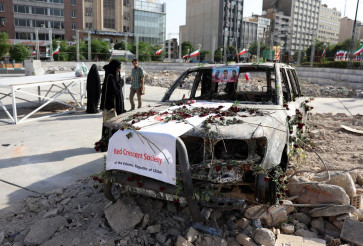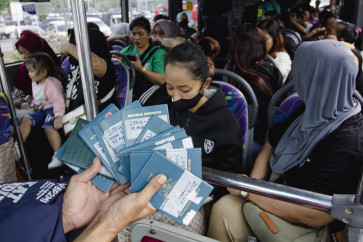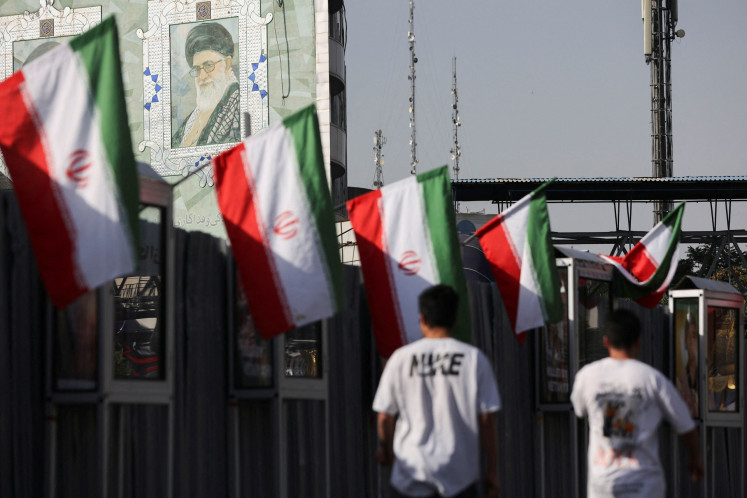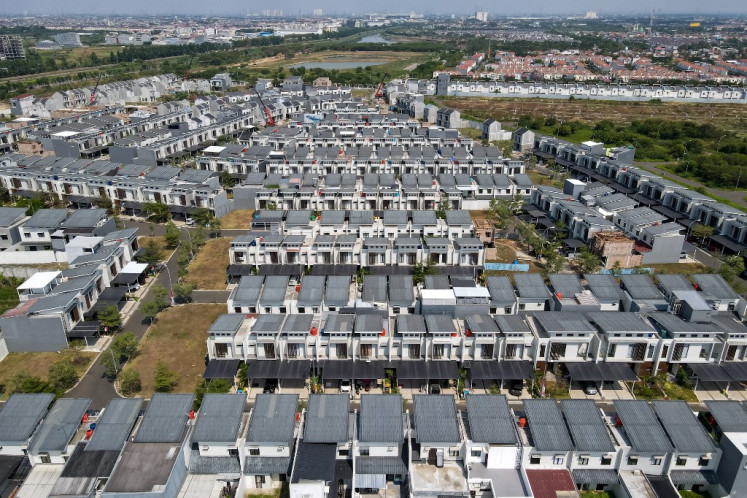Popular Reads
Top Results
Can't find what you're looking for?
View all search resultsPopular Reads
Top Results
Can't find what you're looking for?
View all search resultsJakarta taxi drivers try to survive tougher competition
Waiting patiently: Taxi drivers wait for passengers in the bustling city of Jakarta
Change text size
Gift Premium Articles
to Anyone

Waiting patiently: Taxi drivers wait for passengers in the bustling city of Jakarta.
Regular taxi drivers are struggling to make ends meet amid tighter business competition, with a growing number of passengers using ride-hailing apps.
Jakarta is an endless horizon of concrete, skyscrapers and highways with a road system like a heap of snakes. Chaos reigns supreme.
Yet, taxi drivers do a pretty good job in battling the little daily apocalypses that include choking pollution and hellish congestion. And many of them do it for mediocre wages that sometimes touch the city's minimum wage of Rp 3.1 million (US$280) per month.
Dasuko, who is married with four children and lives in Tanggerang, Banten, works for the Pratama company, one of Jakarta's minor and arguably less reputable taxi companies. The Pratama system is a simple one. Drivers rent a car for the day and funnel Rp 260,000 earned to the company. They keep the remaining earnings above that mark.
Dasuko says he makes between Rp 2 million to Rp 3 million per month, working an average of 24 days. If he has a slow month, he goes to a loan shark to borrow Rp 1 million to keep himself and his family out of destitution, and then pays back the sum the following month.
As a cab driver, his monthly income fluctuates according to any number of factors from the weather to gas prices. Thus Dasuko lives in a state of uncertainty. He swings from month to month between debt and general poverty.
One of his sons has left home, so he now works to support five people. To keep his family sheltered and fed, Dasuko needs a bare minimum of Rp 2.2 million per month, which includes Rp 400,000 for a single rented room, Rp 120,000 for electricity and Rp 1.5 million for food.
However, there are still other costs to consider. Dasuko smokes cigarettes and catches the bus to the company carpool. So add in buses, cigarettes, the threat of some collapse in health, or just the standard little misfortunes that dog everybody, and a family of five surviving on Rp 2 million to Rp 3 million a month begins to look herculean.
Despite the day-to-day struggle to make ends meet, Dasuko does not express any desire to move to a different company.

The Pratama company car pool.
The Pratama system is attractive in its simplicity, and it is unlikely that Dasuko could accept lower wages in the present for the chance of a Rp 50 million paycheck in the future, which is offered under a cooperation scheme by the Express taxi company.
Tarma, an Express taxi driver, said he worked for generally lower wages, but by the end of six years, drivers were given ownership of the car that they had used.
Drivers can then either continue to work privately, or they can sell the car for between Rp 50 and 60 million. It is a slog for six years, but then there is a tremendous boost.
'It inspires me to work hard,' the 41-year-old father of one said.
Life might be easier for Endang Ramdani, a vivacious and philosophical 53-year-old man from Bogor and a Bluebird driver. He is better positioned than Dasuko, partly because Bluebird is perceived as a better and more enterprising company and partly because his wife also brings in an income as a cook at a food stall.
Bluebird operates with a commission-based system whereby a driver's income is scaled according to how much money they bring in. The company offers a small pension to its drivers after they reach 60 and covers car washes and gas as well as providing car insurance.
After costs, Endang earns around Rp 4 million a month, which positions him at the wealthier end of Jakarta's taxi cohort. Endang is happily situated with his company.
'I'm like a king,' he said.
Unlike a good many of his fellow taxi drivers, Endang is not resentful at the recent intrusion of app-based on-demand transportation services such as Uber and Grab.
Recent riots in France exemplified the depth of emotion and anger felt by taxi drivers toward new technology companies transforming their industry and livelihood. Endang, however, would not have joined such protests, including one staged by a number of taxi drivers in Central Jakarta on Tuesday.
Waxing philosophical, Endang said if one is willing to work hard and with good spirits, there is still money to be made. He argues that companies like Uber and Grab represent the development of the era.
'Business competition is certainly becoming sharper, but don't be scared of death before the battle,' he said.
He believes that the spirit of competition can advance a society forward and save it from the slow death of complacency.

Optimistic driver: Endang Ramdani sits in his Bluebird taxi.
Endang is a spirited man, if a little optimistic about the future prospects of the taxi business.
'We must be brave to live,' he said. 'Be relaxed but serious. Not just relaxed. Relaxed but serious.'
There ought to be some firmer documentation of the men and women who presently occupy this particular profession at the present moment ' taxi driving in Jakarta in the second decade of the 21st century. Its existence is a tenuous one, but it exists, and it ought to be photographed before the image fades away.
' Photos by Duncan Evans









